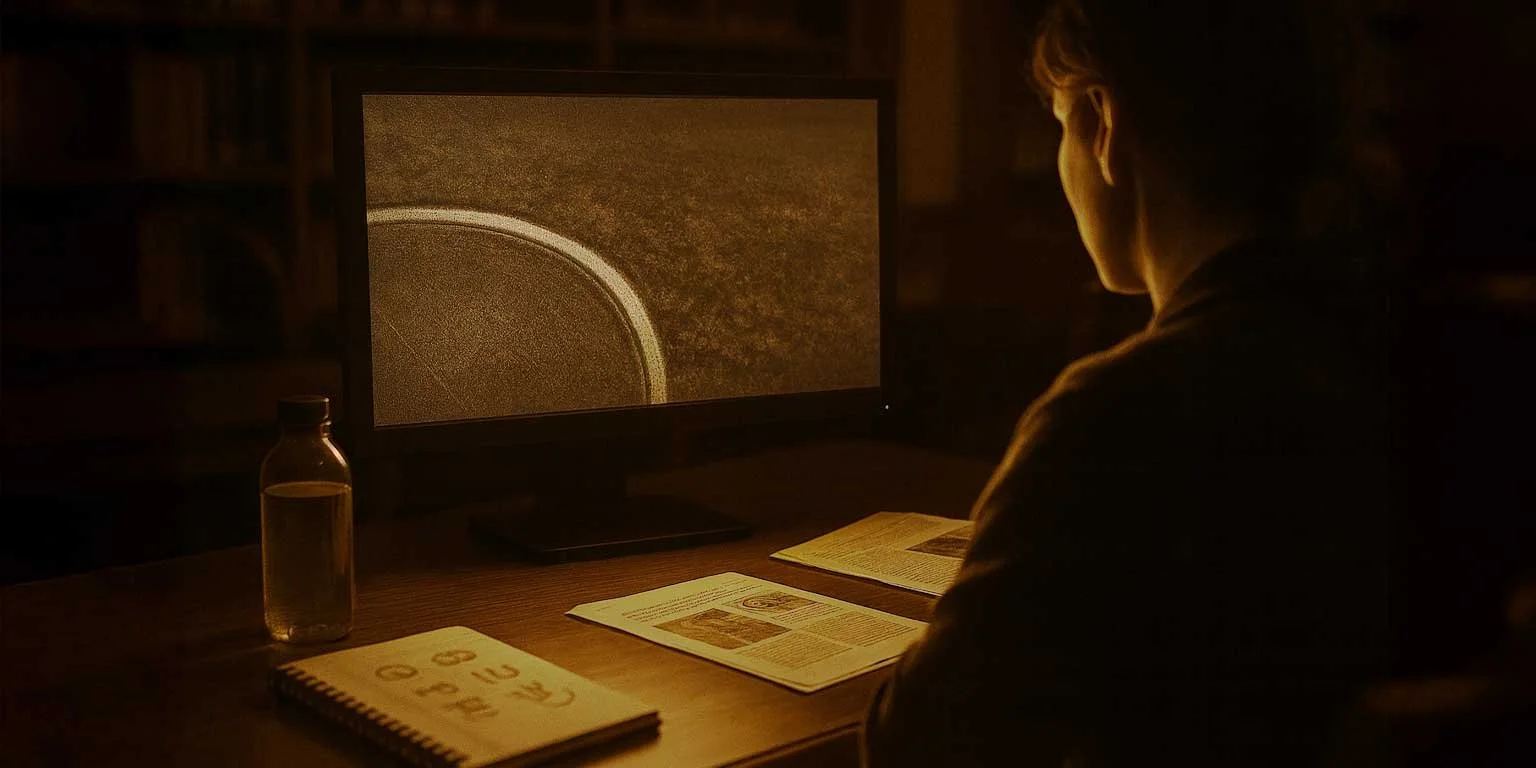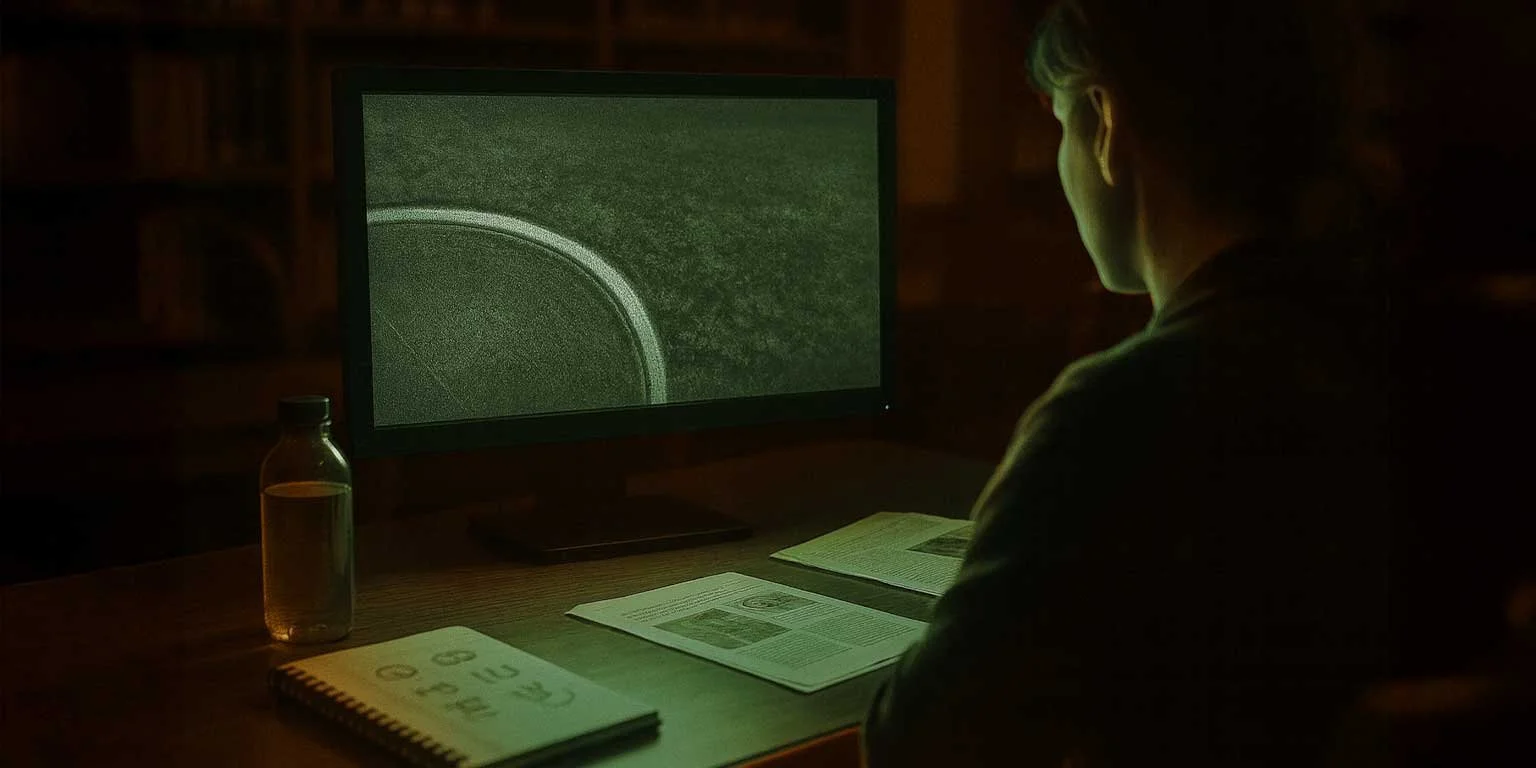
Chapter 3
Rose’s mind spun.
In her favorite seat at the end of the bank of computers, she sipped from her water bottle. Martin’s table sat empty behind her, so today, she had the Gothic High library to herself. School let out three hours earlier, and they would kick her out in an hour.
Usually, she researched something or other for schoolwork, but this afternoon she worked on a different project. She wasn’t upset by her performance earlier in the afternoon because she had already pushed that disaster out of her mind. But she played the video she created for her presentation repeatedly as she analyzed it at varying speeds.
The massive, ten-foot-tall, outer crop circle never moved, yet the ones inside formed slight variations from year to year. A squiggle became a full circle only to vanish the following year, but the primary outside ring didn’t waver. It would be impossible to see any of the changes, except from above.
She paged through one of her notebooks to compare the images to the Primbobi symbols she’d copied from Becca Beckin’s diary—an exact match for the characters “What” and “You.” Could this actually be a communication of some type? The Primbobi stood unique among Native American cultures because they had developed their own form of written communication. The writing reminded Rose of hieroglyphs, though the shapes were totally different from either the Egyptian or Mayan people. But this jumped to a new level. They, or someone, created a moving symbol of some sort that called out in the form of two simple words. “What” and “You.” But it wasn’t just a question. Like an S.O.S., this seemed like a plea for a response. Or was it all in her imagination?
She shook her head to rattle her brain.
Undoubtedly, if she showed this to anyone else, they would say she perceived codes and patterns where none existed. She had heard that before, and it’s the reason she hadn’t presented her work on the crop circles in prior years. People would say the plants and crops grow a bit differently each year, that’s all.
She reran the video.
Her chest tightened as if the message reached inside, past her intellect, and into a part of her soul. This demanded something from the decipherer—a quick response. And not a subtle one. But how? How do you respond when you don’t know the communication method?
The symbols formed again. “What. You.”
“I’m Rose,” she again whispered to the monitor. Dumb.
She closed her eyes, and the image of the moving crop circle appeared in her head. This time the symbols came together, pulsing as if desperately searching for a response. Then the pace quickened as the desperation became a demand. The crop circle burst into flames, and the mountain erupted. Everything for miles around exploded from below. Her ears filled with screams, and all went dark.
Her eyes flew open, and she gasped for breath.
What was that? She was far too logical and methodical to be prone to visions. But it was so vivid. She had never experienced anything like it.
Staring at the screen as the message appeared again and again, she sipped from her bottle but held the water in her mouth.
The crop circle sent a message out to the world, and she had stumbled on it. And it seemed to demand a response—even threaten consequences if she didn’t comply.
She gulped down the water.
How do you respond to that? Like the first person ever to hear a radio broadcast, she now needed to find a way to talk back. The only way to respond would be to create a broadcast of her own. But, though she discovered it, the message was not meant for her alone, and her voice alone would probably go unheard, like shouting against the wind.
She would need more voices—a lot of them. Enlisting the town residents to broadcast would answer the sender or senders’ question and tell them who they were. Buried in the noise, the correct response would come through.
But the pull was even more potent. Though Rose could only discern two words, apparently much more lay under the moving squiggles and shapes. Instead of simply inspiring an idea, somehow, that message implanted a guttural, overwhelming need to respond—along with a palpable sense of foreboding. Though not explicit in the decipherable two words, a threat of impending disaster coursed through her. If she failed in responding, something terrible—something catastrophic—would happen.
She shuddered as a chill ripped through her.
But she would respond. Whoever they are, they want to learn about us and understand who we are.
Her hands raised, and her palms pressed against the sides of her head as if keeping her brain from exploding.
A method formed all at once, definitive and nearly complete. Broadcast a response by posting videos. Not just her, but everyone in town. Answer them with our voices—tell them our stories—loudly. Boldly.
The how now became the challenge. She would respond to this call, but such a project would force her to push through her insecurities and onto a new, twisting, dark path. She had to protect the senders of the message while protecting Beckinfield from them once they heard.
On top of all, the urgency was palpable. If that vision was indeed a byproduct of reading those words, by deciphering that message, she had started the clock.
Weird. But she felt compelled to make a video to record her thoughts. That’s new. She pulled out her cell phone and leaned it against some books.
Her pulse quickened at being on camera. She let out a deep breath. No one else will ever see this.
She hit record.
#
Ten minutes later, Rose poked her head into her History classroom. “I want to build a website.”
Ms. Evans stopped packing her bag and looked to the doorway. “Rose, I was proud of you today—”
Rose strode in. “We’ve got to tell them we’re here. We’ve got to let them know about Beckinfield. Who we are. Who we aren’t.”
“What do you mean? Tell who?”
We’ve got to answer their message, and we’ve got to do it quickly; otherwise, something terrifying will happen. But instead, she said, “Tell everyone.”
“Like our Facebook page.”
She had to sell this. “No, specifically for and about our town. But big... loud. A whole website where all of us have voices. We’ll get all our residents to tell their stories, tell their personal experiences within the town. Everyone will create video diaries, and combined, they will tell the story of our town. The story of Beckinfield to show them... show everyone... who we are.”
Ms. Evans stayed quiet. She sat on a student desk as the concept played behind her eyes. Finally, she spoke. “Do you know anything about building websites?”
“Nothing.”
“Then how are you going to do it?”
“No idea yet. I just know that I have to.”
Ms. Evans put her things down. “Why?”
“Because this town is just a dot on a map. It doesn’t even have a Wikipedia page. No one knows about us, so we’re like ghosts relegated to a realm where we have no voice, wandering the world like we don’t exist. But we do, and we’re ready to let them know.”
“You understand how much something like that would cost to do it, right?”
“Five thousand, four hundred, and thirty-two dollars.”
Ms. Evans jerked her head back at the response. “What?”
“I made the number up. But if you got me five thousand, four hundred, and thirty-two dollars, I’d bring it in under budget.”
“Rose—”
“I’ll oversee it, and I’ll post the first video. And more.”
“But you don’t know anything about building a website?”
“I’ll find the people who can. Students. They’re all going to be students. This will be our final senior class project. A gift to the town.”
Ms. Evans stayed silent for a long moment, then shook her head.
“Rose, if there’s anyone I’d trust to get this done, it would be you, but there’s so much that has to go into this. Hosting videos, creating filters, making sure the content isn’t explicit...”
“Yes, there is a lot to do. This is a huge project. And then I’ve got to convince people to use the site. To post videos and create stories that will represent us. I see it all.”
Ms. Evans thought again. Then she nodded her head.
“I’ve got to run it through the principal’s office.”
“So, I should talk to him?” asked Rose.
“Would be better if you had a faculty member to sponsor you, and I’ve got a lot on my plate.”
“Then who should I talk to?”
“I haven’t said no. Give me a few weeks and—”
“No.”
“Pardon me?”
“We can’t wait. If you can’t help, I’ll find someone else.”
“What’s the rush, Rose?”
“It’s time.” They won’t wait long, now. But she couldn’t say that. “And I’m leaving for Stanford to start summer classes right after graduation. We’ve got to do this now.”
